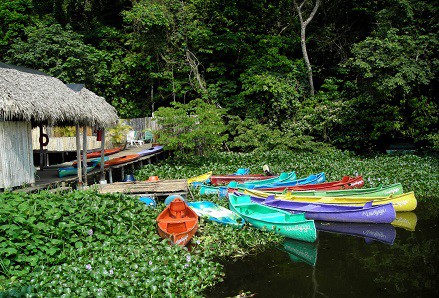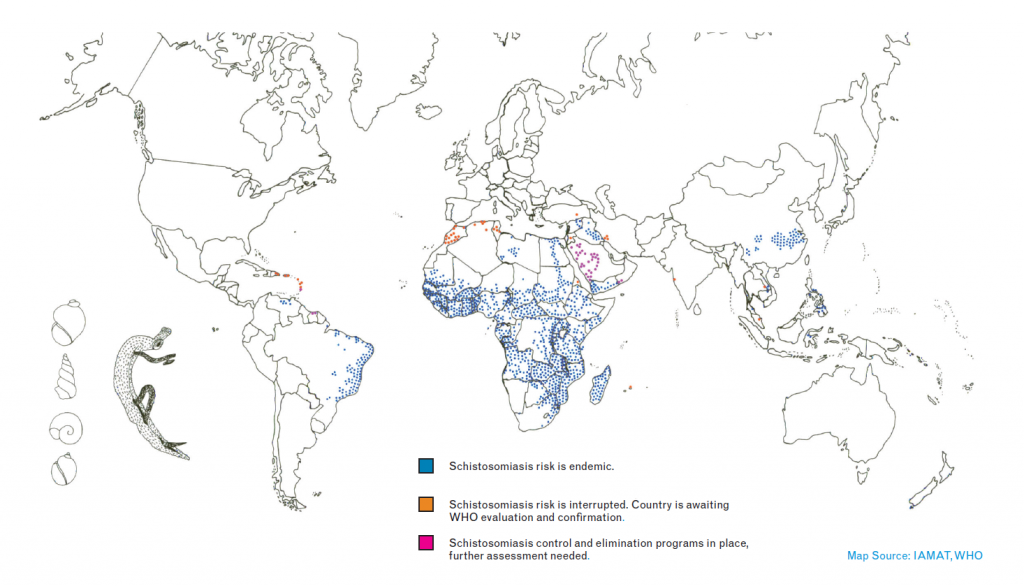If your next adventure will take you rafting or swimming in fresh water, you should know about Schistosomiasis.
What do snails have to do with travel health?
You’re familiar with Yellow Fever, Malaria, and Traveller’s Diarrhea, but here’s one travel health risk you may not have heard of: Schistosomiasis. Also known as Bilharzia, Schistosomiasis is a parasitic infection transmitted by freshwater snails present in Africa and parts of Southeast Asia, South America, the Middle East, and some Caribbean islands. The culprit is the trematode flatworm parasite that is transmitted by small snails which are difficult to spot on the shores of lakes, rivers, streams and ponds. Coming into brief contact with fresh water contaminated with one of the eight flatworms that make humans ill can be enough to cause infection: the flatworm larvae (cercariae) can burrow through unbroken skin and the new host is none the wiser.
What’s an adventure traveller to do?
Schistosomiasis should be on every adventure or eco traveller’s radar: there’s no way to tell if it’s safe to swim just by looking at a river or lake, and swimming is not the only way to contract Schistosomiasis
When you’re travelling to an area where Schistosomiasis is present, avoid contact with fresh water. If you accidentally come into contact with fresh water, wipe the area off with alcohol and a dry towel immediately.
Boil or chlorinate water from rivers or lakes before drinking. Water for showering and washing clothes should also be boiled or chlorinated, but it’s relatively safe if stored in a snail-free container for 2-3 days before use. (There is no risk of Schistosomiasis in salt water.)
There will be times when you’ll be tempted to disregard this advice because it’s just too hot, too sunny, or the water looks too beautiful to pass up. Don’t ignore this advice! While Schistosomiasis is easily treated in its early stages, it can cause permanent damage to the urinary tract, bladder, kidneys, liver, or intestinal system if not diagnosed early.
Resources for the responsible traveller
It’s hard to find information on Schistosomiasis. That’s why we produced two thoroughly researched guides to help you understand the extent of the problem. Our Be Aware of Schistosomiasis Whitepaper and World Schistosomiasis Risk Chart provide detailed information on the life cycle of the flatworm, prevention rules, and treatment options.
The map above shows areas where Schistosomiasis is endemic (in blue). Orange dots show that there have been no new human infections and the country is awaiting confirmation from the WHO to be declared Schistosomiasis-free. Pink dots show areas where Schistosomiasis control measures are in place and need further evaluation to measure their effectiveness, or where programs have stopped due to civil unrest or war.
Global health
Schistosomiasis is a Neglected Tropical Disease. In communities where the infection is endemic, it disrupts day-to-day life. If left untreated, the infection causes children to miss school and prevents adults from working, limiting their contributions to their community. Al Jazeera’s Lifelines series produced an informative episode on the impacts of Schistosomiasis in one community in Senegal, showing how residents and researchers are taking action to eliminate the disease.
Schistosomiasis has a good chance of being controlled namely through building sanitation infrastructure and public health education programs in rural areas. As a traveller, follow the golden rules to avoid Schistosomiasis.
Note that even if there is no Schistosomiasis risk in a lake, pond, river or stream, you may still be at risk of other illnesses. It may look clean, but consider industrial contamination, agricultural run-off, human or animal waste, and infections like E. coli and Leptospirosis before jumping in.
Photo courtesy of Gloria Guerrero, freeimages.
Like what you see? Let us know on Facebook at IAMATHealth or on Twitter at @IAMAT_Travel #schisto.




